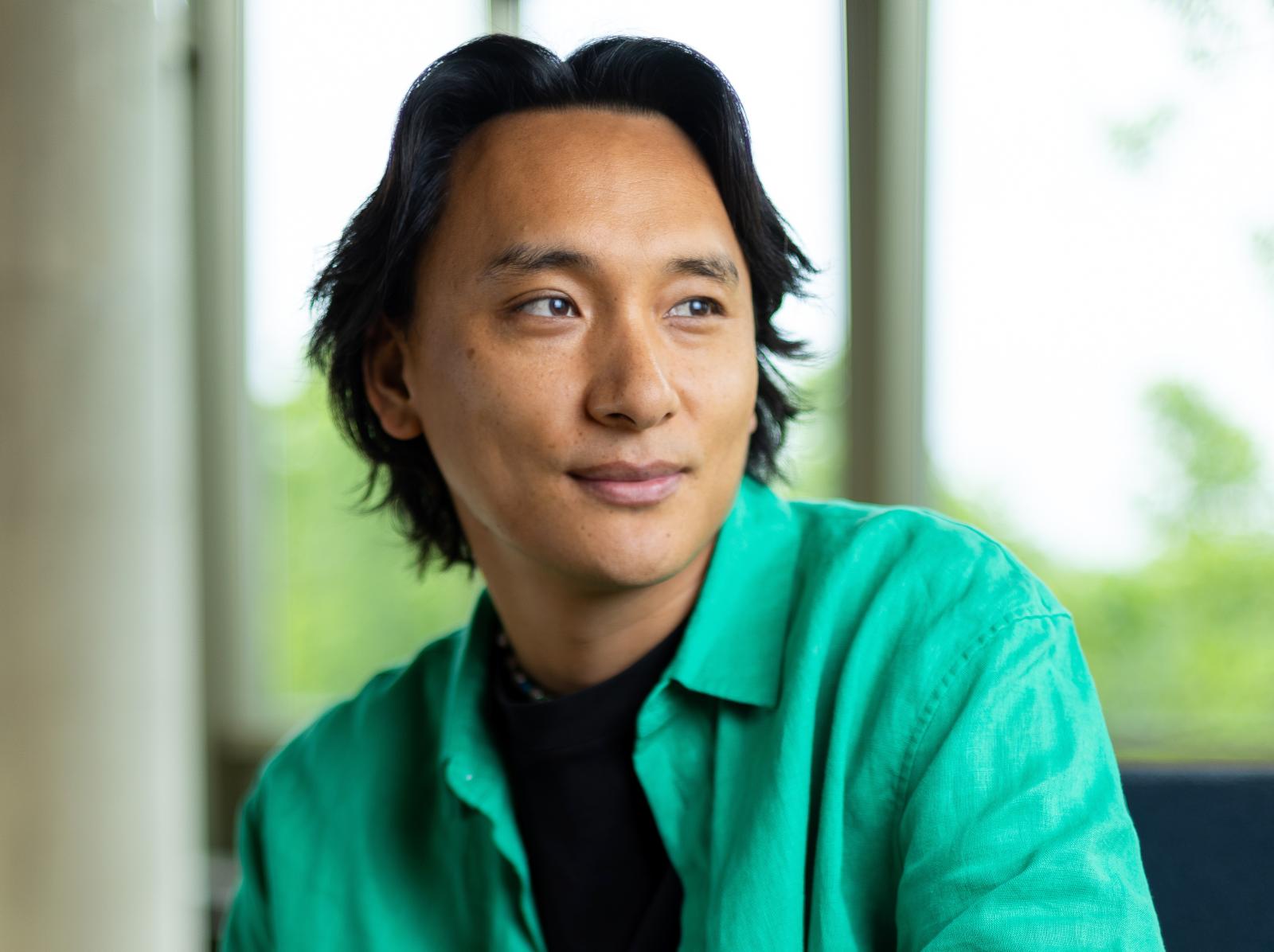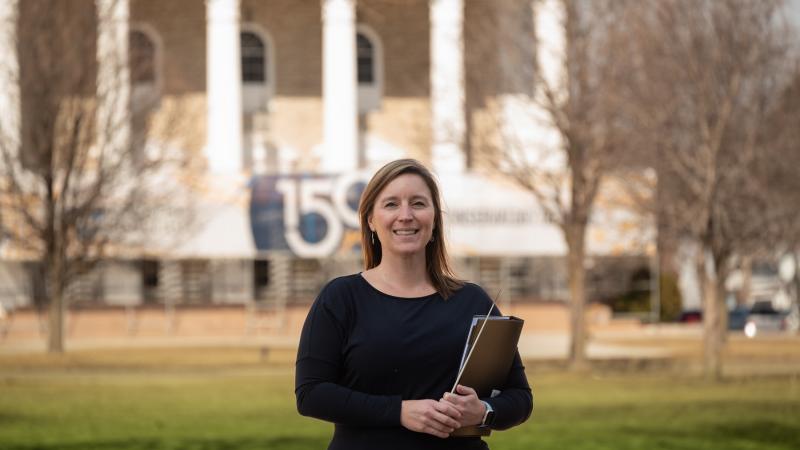This story first appeared in the 2024 spring-summer edition of Lawrence magazine. See a digital version of the magazine here.
Pawo Choyning Dorji ’06 is talking on a Zoom call from Los Angeles just hours after finding out his latest film was left off the list of 2024 Academy Award nominations.
There is not a hint of discouragement.
“The journey I’ve had so far, I think that itself is the greatest success one can aspire for,” said a smiling Dorji.
His The Monk and the Gun was released two years after his debut film, Lunana: A Yak in the Classroom, drew widespread acclaim and earned Dorji a 2022 Oscar nomination. The new film, which made the rounds of film festivals in 2023 and was released in the United States in early 2024, was one of 15 films shortlisted for the Oscars in the International Feature Film category, giving the Bhutanese filmmaker a seat at the table for a series of Hollywood events and interviews in the lead-up to the 2024 Oscars.
“For me, shortlisted or nominated or anything else, this has been such a magical experience,” Dorji said.
A Bhutan native who calls himself a global citizen, Dorji has been on an incredible journey—four years pursuing a government major at Lawrence, two years studying Buddhism in a monastery in India, nearly a decade traveling the world as a photographer, then returning to Bhutan with an idea to merge all those interests in the telling of stories through film.
Back on campus
That winding journey came full circle for Dorji as he returned to Lawrence in mid-June to speak at Commencement and receive an honorary doctorate.
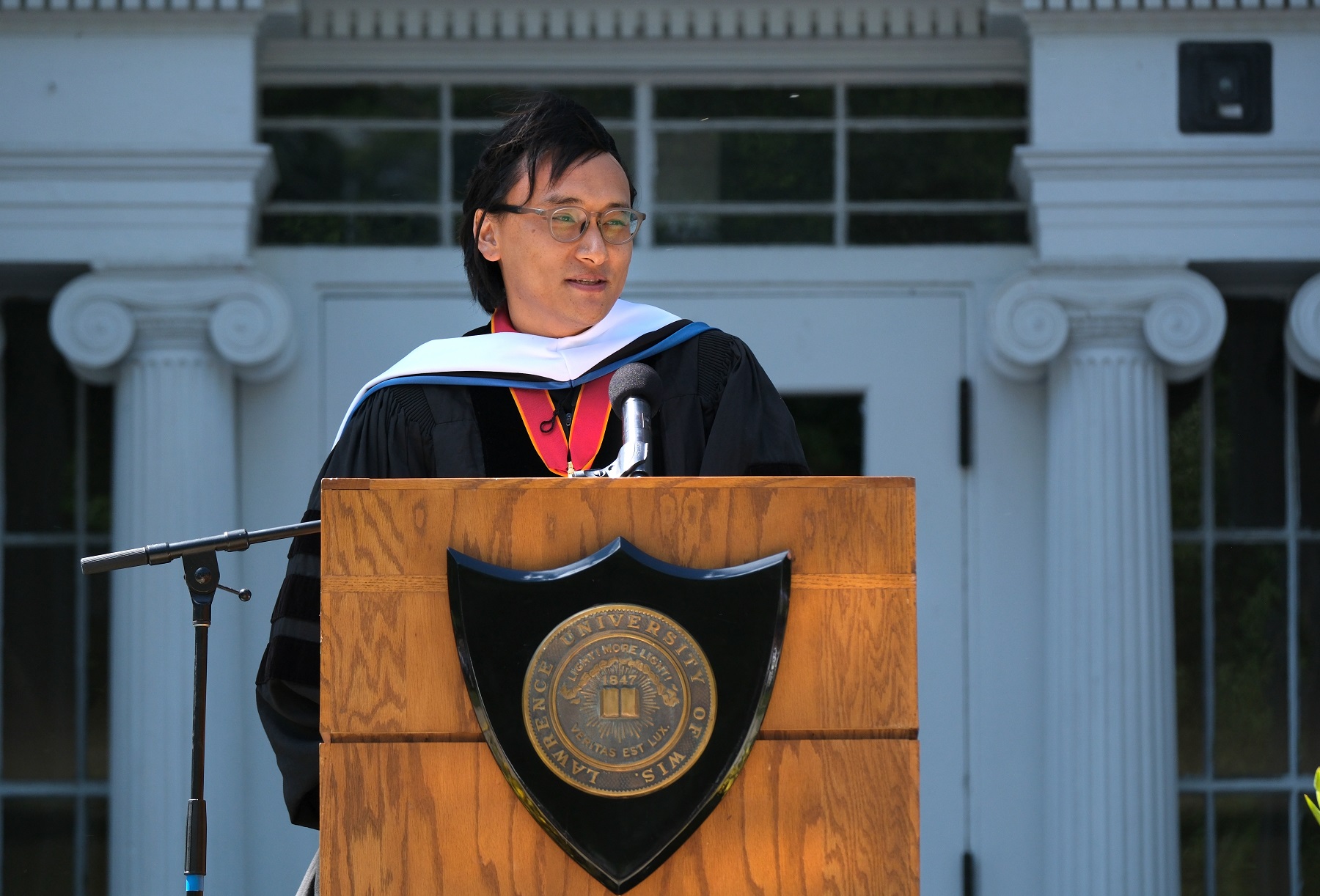
Pawo Choyning Dorji '06 speaks at Lawrence University's 2024 Commencement. (Photo by Danny Damiani)
His undergraduate experience, he said, continues to inform almost every decision—creative and otherwise—that he makes. He points to his days at Lawrence for setting a foundation that has allowed him to grow as an artist, a thinker, and an innovator. He studied government, took courses across the humanities, explored his spirituality, served as president of Lawrence International, and worked at International House.
“With the education I had at Lawrence, that liberal arts education, it really opened my mind,” Dorji said. “It made me very curious—curious for life, not just to be a filmmaker. You have to have that curiosity; you have to have the openness. All my experiences at Lawrence, I think, led to that.”
The son of a diplomat, Dorji has long had a fascination with history and global politics. That all came to play in the making of The Monk and the Gun, a film that parodies the politics of the United States while exploring the anxieties surrounding Bhutan’s own experiment with democracy.
“I was at a film festival, and they were asking me, how did a Bhutanese person end up becoming a filmmaker and then making a film that is a satire about democracy?” Dorji said. “The Monk and the Gun is actually a satire about American democracy. I said, ‘Well, you know, it’s funny; I went to the Midwest, and I studied at Lawrence, and I studied government. And that combined with this liberal arts education, it really opened my mind up for everything. … Over time, I combined my experiences at Lawrence, my experiences in a Buddhist monastery in modern India, and I ended up making a film that ties together this philosophy with values of democracy.’”
Finding an audience
Dorji the filmmaker first started garnering attention when Lunana was accepted at the BFI London Film Festival in 2020. Filmed in 2018 and 2019 and made for less than $300,000, Lunana—in the Dzongkha language, with subtitles—was the longest of longshots. The story, written by Dorji, is that of a young teacher, Ugyen, assigned as part of a service agreement to teach in Lunana, Bhutan’s most remote village. Initially unprepared for the physical and emotional toll that would come, Ugyen finds himself increasingly drawn to his young students and the people of the Himalayan village. A yak, gifted to the teacher upon his arrival, becomes a classroom fixture.
The filming in Bhutan’s Lunana Valley, a mountainous region bordering far western China, was itself a challenge. Solar batteries were needed because the location was so remote. Dorji and a crew of 35 walked for eight days to reach the tiny village, about three miles above sea level. They moved much of their gear on mules. The village schoolchildren who appear in the film had no acting experience, and no familiarity with films or filmmaking.
“No fancy anything; no professional actors, no professional crew,” Dorji said. “And after I made that film, it was a reality check. You could say I was very innocent about how the film industry worked. I thought, ‘OK, I’ll get some money together and I’ll make this film and I’ll share it with the world, and everyone will watch it, and everyone will appreciate it.’ But that isn’t how the industry works. It’s all about production companies, producers, agencies, distributors.”
For a long stretch, Lunana garnered nothing but rejection. Then came word that the BFI London Film Festival would show the film, giving it a world premiere. It drew an enthusiastic reaction.
“From there it just grew,” Dorji said.
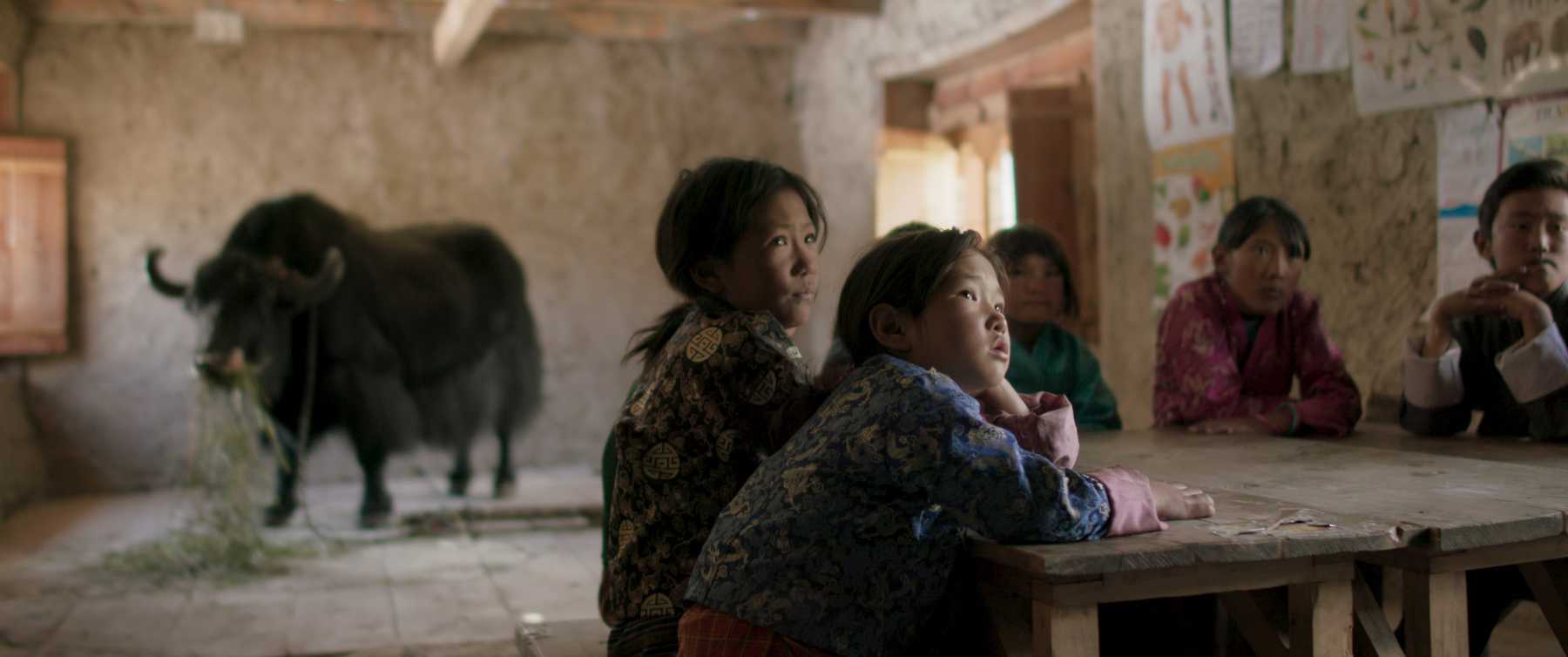
Lunana: A Yak in the Classroom earned Pawo Choyning Dorji '06 a 2022 Oscar nomination.
More film festivals would follow. It won the Audience Choice Award for Best Feature Film and the Best of the Fest at the 2020 Palm Springs International Film Festival. It earned honors at the Film Festival della Lessinia in Italy and the Festival International du film de Saint-Jean-de-luz in France. A distributor picked up the film and set a U.S. release date.
Lunana was shortlisted for an Oscar in December 2021, which brought Dorji to Hollywood for a blitz of appearances. Meetings with Hollywood royalty would have Dorji’s head spinning. Hollywood writers clamored for interviews, anxious to talk about the challenges of filming in such a remote location, the mysteries and seeming innocence of Bhutan, and why there was a yak in the classroom.
Then came the Oscar nomination and the invite to the 2022 Academy Awards. While Dorji would not win the Oscar—it went to Drive My Car from Japanese filmmaker Ryusuke Hamaguchi—his life was forever changed.
“Along my journey there were different people who were willing to take a chance on an unknown filmmaker from the Himalayas,” Dorji said. “Each chance was a stepping-stone for the film. It’s been amazing. I’m very grateful.”
Film No. 2 draws applause
Dorji’s new-found status as an Oscar-nominated filmmaker brought new opportunities. And new challenges. As he set out to make his follow-up film, he was approached by agents and producers and was offered Hollywood actors and an infusion of cash.
“Sometimes that new attention can lead you down a certain path,” Dorji said. “Just imagine where I came from. I had solar batteries to charge my camera, I had a yak in my classroom. That’s how I started. To suddenly be approached by all these Hollywood execs and agents, it can turn your head.”
He said he kept it all at arm’s length, in part because of a conversation he had in 2022 with Ang Lee, director of Oscar-winning films Sense and Sensibility, Crouching Tiger, Hidden Dragon, and Brokeback Mountain.
“He told me, ‘Pawo, when I look at you, I see a younger version of myself,’” Dorji said. “’There is so much passion with how you want to tell your stories. But there also is a lot of innocence that I had, and you have right now.’ He told me, ‘You will make more films, you will grow as a filmmaker, but it’s a very vicious industry. With every film you make, they will shed away your innocence.’ And he was saying, ‘If I was to give you one piece of advice, it would be not to lose that heart or innocence. Make sure you make every film with the same heart you made Lunana. Once you’ve lost that innocence, it’s very difficult to tap back into it.’”
Dorji held that advice close as be began filming The Monk and the Gun.
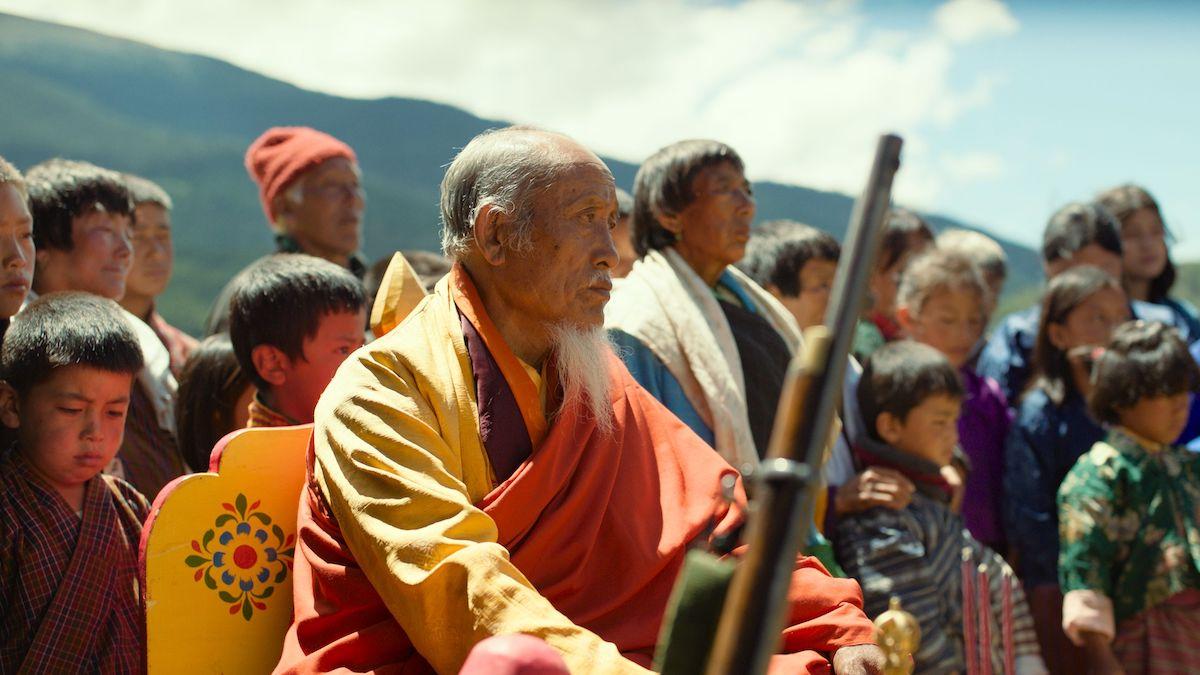
The Monk and the Gun, Pawo Choyning Dorji's second film, was shortlisted for a 2024 Oscar nomination.
Set in 2006, the film depicts the Kingdom of Bhutan’s transition to democracy through an oft-humorous story involving a mock election, a valuable antique rifle that falls into the hands of a monk, an American weapons collector in pursuit, villagers unmoved by material goods, and Bhutan’s uncomfortable dalliance with the modern world.
“As I started to make this film, I was being offered different Hollywood actors,” Dorji said. “I was being offered maybe more money than I would need. But at the end, I stayed true to what Ang Lee had said. I have an American character in the movie, and I was offered Hollywood actors for that role, but I decided to stay with what I had. He was an amateur actor. I still wanted to have the innocence in the film. The film is about the loss of innocence. I felt if I had a Hollywood actor it would be a very different story. The media wouldn’t be saying, ‘Oh, Pawo, the director of A Yak in the Classroom has made a second film, which is about the modernization and loss of innocence of this country; it would be about, ‘Oh, this Hollywood actor went up to the mountains and he went through so much hardship to make a film with the locals up there.’ I think I was fortunate to have met Ang Lee and gotten the advice I received. I tried to keep the innocence of the story.”
The Monk and the Gun earned the Showcase Audience Choice Award at the Vancouver International Film Festival and the Special Jury Prize at the Rome Film Festival before being shortlisted by the Academy. It was picked up by a distributor and given a February 2024 release in the U.S., where it drew favorable reviews.
The Washington Post gave it three and a half stars: “Though it takes place in the recent past, at a time when the Bhutanese people were still getting used to such American imports as James Bond movies and “black water” (Coca-Cola), the film has something important to say about the promise and the perils of the present.”
The Gene Siskel Film Center called it a “playful and wise ensemble drama and a wholly gratifying account of a nation at a crucial inflection point.” The Hollywood Reporter said it was “lively and piquant, demonstrating the director’s sense of humor and sharp observational skills.”
Storytelling, or untying knots
That Dorji’s winding path led to adventures in storytelling may not be all that much of a surprise. He called it a gradual journey of discovery, one that was nourished during his time at Lawrence.
He dove deep into storytelling while working as a photographer. He published two photo journals, Seeing Sacred: Light and Shadows and The Light of the Moon: The Legacy of Xuanzang of Tang. The latter was a five-year photo project to retrace lost history of Buddhism. It took him through the ancient silk roads of the Gobi and Taklamakan deserts of Xinjiang, China, over the Hindu Kush mountains in Afghanistan and the Karakorams in Pakistan, and through India, Sri Lanka, and Nepal.
It would lead him back to Bhutan, where his exploration of filmmaking would begin.
“In Bhutan, we are a very unique culture that is really rooted in a veneration for the past, our culture, our traditions,” he said. “With that, storytelling becomes a very important aspect of our culture. Specifically, the oral lineage that is passed down from generation to generation. For me, I grew up in that culture. I have a love for storytelling. Even when I was at Lawrence, I was very interested in storytelling. I took a lot of history classes at Lawrence. That love for history and story was always there.”
The language of storytelling is different in Bhutan, a nation buffered for years from television and the internet and other modern advancements.
“In English, you say tell me a story,” Dorji said. “But in my language, it is, please untie a knot for me. The act of telling a story is supposed to have this untying, freeing, liberating purpose. You grow up in that culture where storytelling is such an important part of life, and you start adopting different mediums to which you want to untie knots. I started writing. Then I became a photographer. I started combining writing and photography. I published some photography books. Then I slowly came to the realization that the most powerful medium to which we can untie knots in this modern world is moving pictures, it’s film. That’s what led me to this work.”
The business of movies also is a whole different experience in Bhutan. There are no cinemas. People gather in a community hall with a projector, Dorji said. There is no film industry to speak of. The submission of Lunana for the Academy Awards, originally planned for 2021, was delayed a year because the Academy no longer officially recognized Bhutan’s national film committee because it had not submitted a film in 23 years.
“This is where I come from,” Dorji said. “This is why this is so special. When I tell people in Hollywood that I come from a country where people put yaks in their classrooms and we don’t have a film industry, it’s difficult for them to imagine. Coming from a country like that and trying to make films and at the same time being put on a platform where you have to compete with the very best filmmakers in the world, it’s a big challenge. Especially a country like Bhutan. We are very small. We are very poor. And we have never had examples of people who have achieved something in this field that the rest of the country can look up to as an example.”
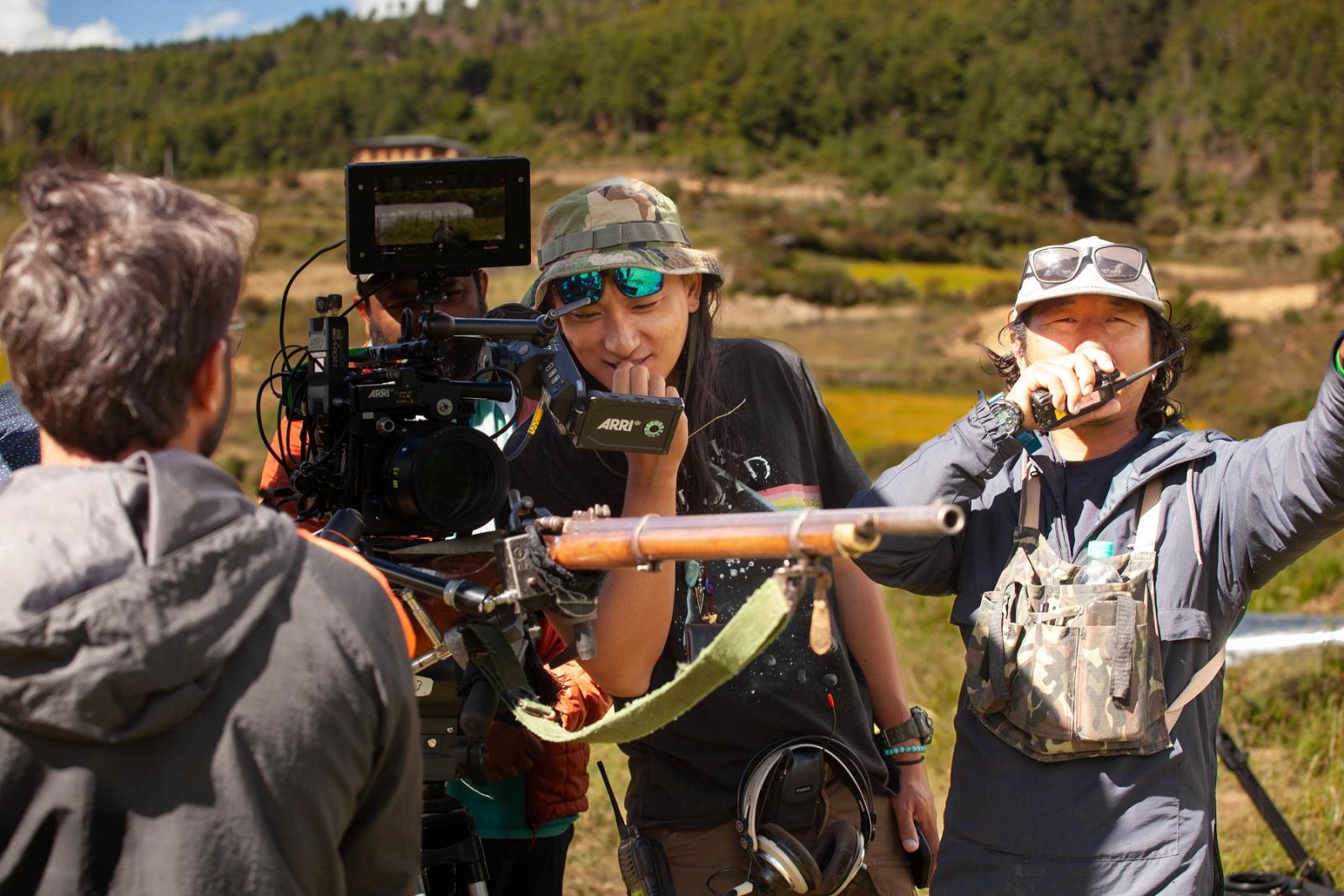
Pawo Choyning Dorji leads his film crew during the making of The Monk and the Gun in Bhutan.
To stand among other Oscar nominees with his first film was surreal, Dorji said. And then to come back and be shortlisted with his second film was stunning.
“I think my previous film’s Oscar nomination was the first time in Bhutan’s history where we had something to look at like, wow, that is a Bhutanese up there with Martin Scorsese,” Dorji said. “It gave Bhutan, especially the youth, something to aspire to, to give them hope. I am one of them. I represent their culture. I dress like them. I am them. They see themselves in me.”
The people of Bhutan have embraced Dorji and his films. Following his 2022 Oscar nomination, he became the youngest recipient of the Royal Order of Bhutan, The Druk Thuksey, awarded by the king to recognize an individual for distinguished service to the Bhutanese nation and people.
His latest film explores territory that might make some in Bhutan uncomfortable. The Monk and the Gun is centered on Bhutan’s real journey to modernization, to becoming a democratic country, much of it based on events of the mid-2000s, about the time Dorji was graduating from Lawrence.
“When it was screened in Bhutan, so many people were emotional, they were crying,” Dorji said. “I thought that was so beautiful. Within this comedy, within this satire, in this film that is about the country’s path to modernization, the Bhutanese were actually seeing their own journey and how in the quest to try to get something they think they needed they ended up losing what they had. People were getting emotional. That is the beauty of art, right? Everyone looks at it and it almost becomes a medium upon which you see a reflection of your own values.”
Staying connected
While Dorji spent the bulk of his youth in Bhutan, he lived at times in different parts of the world because of his father’s work as a diplomat—the Middle East, Europe, and India. He attended an American boarding school in India in 11th and 12th grades. It was while there that he started thinking about attending college in the U.S. Lawrence caught his eye in part because several graduates from his high school were already studying there. Also, Lawrence had a large and engaged international student population, and David Mulford ’59, then the U.S. ambassador to Bhutan, is a Lawrence graduate.
“That caught my attention,” Dorji said.
“I came to Lawrence and had four wonderful years,” he said. “Amazing friendships, amazing experience.”
Dorji, who is married with two children, said he reconnected with some of his Lawrence classmates when he screened The Monk and the Gun at Soho House in New York in late 2023.
“It was so magical seeing them,” he said. “We were talking about our time at Lawrence. It was a beautiful time. Some of my classmates have a group chat that is very active. Many of us have become dads and we are living in different parts of the world. We keep sending photos of our growing families, career accomplishments. I’ve had them cheering me on.”
Dorji and his family are moving from Taiwan to Los Angeles this summer.
He said he wants to challenge himself as a filmmaker, go outside of his comfort zone. That may take him outside of Bhutan. But he wants to do so while maintaining the heart of his storytelling.
“I am a citizen of the world,” Dorji said. “I have all this multicultural upbringing. Living in Wisconsin for four years really had a huge impact on me—who I am now and how I see the world, how I tell my stories.”
